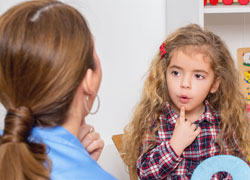Speech Delay Singapore

All children are born with some ability to communicate. From a baby's first cries and coos to the complex speech production of adults, we all need and desire to communicate with others. However, for some children, the development of speech and language skills may be difficult. It may be equally difficult or frustrating for caregivers and adults when communication is ineffective.
Speech delay refers to children who do not start talking at the expected age.
Some possible causes for a speech and/or language delay in children are exposure to more than one language; hearing loss; chronic ear infections as an infant/toddler or child; brain injury before, during, or after birth; syndromes; mental retardation; ASD, (autism spectrum disorder); auditory processing disorder and oral-motor planning disorder. Some children are delayed in language/communication for no apparent reason.
To ensure that a child with delayed speech or language delay receives help early, it is extremely important to recognize the warning signs of a delay. There are specific communication milestones that children are expected to reach by certain ages, and a child who has missed one or more of these milestones may need extra help to catch up.
A speech therapist is a specialist who has been trained to diagnose and treat the various disorders of speech. Before a speech and language evaluation is conducted, a hearing screening or test should be conducted to rule out a hearing loss. The primary goal of language remediation is to teach the child strategies for comprehending spoken language and producing appropriate linguistic or communicative behavior. The speech-language pathologist can help parents learn ways of encouraging and enhancing the child's communicative skills.

Suggestions to improve speech/language
- Communicate more with your child - talk, sing and encourage repetition
- Read daily to your child
- Reinforce speech and language throughout the day
When a child sends a message, whether it is with a gesture, a sound, or a word, his parents' responses serve as helpful feedback that reinforce and encourage his learning. This responsive feedback is an essential ingredient in the language-learning process for every child.